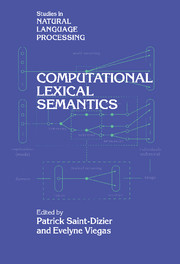Book contents
- Frontmatter
- Contents
- List of contributors
- Preface
- 1 An introduction to lexical semantics from a linguistic and a psycholinguistic perspective
- Part I Psycholinguistics for lexical semantics
- Part II Foundational issues in lexical semantics
- Part III Lexical databases
- Part IV Lexical semantics and artificial intelligence
- Part V Applications
- Part VI Computer models for lexical semantics
- 19 Introducing LexLog
- 20 Constraint propagation techniques for lexical semantics descriptions
- Author index
- Subject index
19 - Introducing LexLog
Published online by Cambridge University Press: 29 September 2009
- Frontmatter
- Contents
- List of contributors
- Preface
- 1 An introduction to lexical semantics from a linguistic and a psycholinguistic perspective
- Part I Psycholinguistics for lexical semantics
- Part II Foundational issues in lexical semantics
- Part III Lexical databases
- Part IV Lexical semantics and artificial intelligence
- Part V Applications
- Part VI Computer models for lexical semantics
- 19 Introducing LexLog
- 20 Constraint propagation techniques for lexical semantics descriptions
- Author index
- Subject index
Summary
Introduction
LexLog is not a lexical theory, but a package of logical specifications for constructing explicit representations for lexical items in restricted information domains. We usually call a domain “restricted” in two main cases.
The domain is notionally bounded. It is sufficiently simple to be decomposed into an organized finite set of notions, which might be enriched, if necessary, by applying a finite number of explicit combination rules. Metaphorically, one could say that the domain has been “axiomatized”. A clear example of this situation can be found in Palmer (1990).
The domain is lexically bounded. The representations to be constructed apply to a finite set of lexical items, and not to the whole of a language, or to an indefinite set of terms.
While they are often associated, neither of these properties strictly implies the other. For example, although the use of a statistical tool like PATHFINDER (Schvaneveldt, 1990) allows the construction of limited lexical clusters (case 2), their notional homogeneity is not warranted by the clustering procedure. E.g., in a study of the word marriage based on the definitions in the Longman Dictionary of Contemporary English (Wilks et al., 1989), the words marriage and muslim co-occur. Although the religious link is obvious, making precise the amount of knowledge about muslim which would be relevant to marriage is not easy. LexLog is designed only for situations which exhibit the TWO forms of boundedness, that is, it can be of some help only when the domain allows the use of a finite notional and a finite lexical basis.
- Type
- Chapter
- Information
- Computational Lexical Semantics , pp. 399 - 425Publisher: Cambridge University PressPrint publication year: 1995

